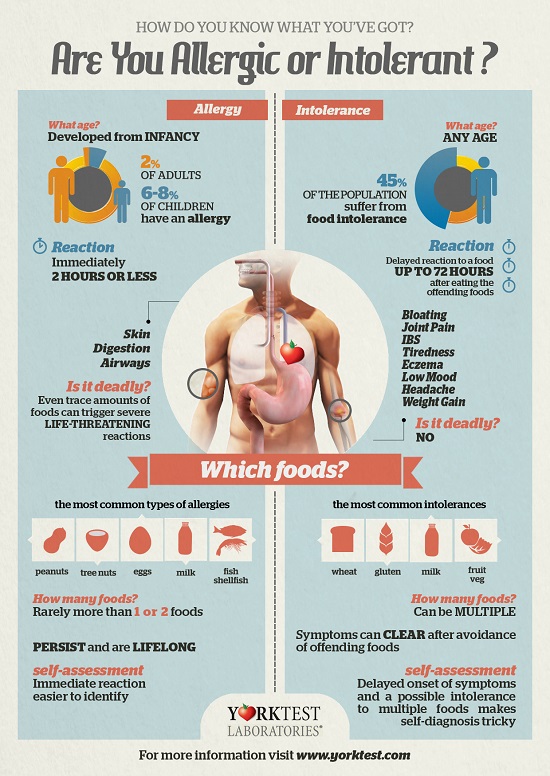About ten years ago, I took a YorkTest test on the advice of my then nutritionist. I wasn’t getting any help from my doctor at the time who told me I couldn’t possibly have other allergies! We were struggling to pinpoint which foods were triggering my stomach and skin complaints. They didn’t seem to be reactions like my allergy to nuts and dairy so she suggested an elimination diet, and to compliment this I did the YorkTest basic FirstStep test to see if this might help. I can’t remember now exactly which foods came up, but I know tomato and celery were positives as well as other things including white fish, eggs and wheat.
You can imagine the elimination process was hard work, it is strict diet which cuts out all the allergens and other foods the test indicated I had some type of reaction to – such as chicken, lamb, rice and rice milk products etc. When we reintroduced the foods, we discovered that celery and tomato did indeed have a marked effect on my eczema. Some things that did come up in the test are foods I can eat without any problems, but the elimination diet does help you to learn which results were false. The understanding of how to maintain a balanced healthy diet is very important, NEVER start an elimination diet and cut out food groups without this knowledge.
Would I recommend the test? It’s not a simple instant cure, but it was an excellent starting point for me to work from. Here is some information about the reliability of food intolerance tests.
Are Food Intolerance Tests Reliable?
Food intolerances are becoming an increasingly common condition but are still often mistaken for food allergies. A food allergy is a reaction produced by the body’s immune system when a person comes into contact with a normally harmless substance, and the reaction occurs relatively quickly. Food intolerance, on the other hand, rarely involves the immune system and reactions can take up to 72 hours.
There is not one clear symptom that will indicate that you’re suffering from food intolerances as there are plenty of symptoms that might be attributed. Some people have acne, others have stomach cramps or headaches but perhaps one of the most common symptoms is IBS (irritable bowel syndrome). In cases where trigger foods are easy to identify it can be tempting to self-diagnose. However, if you are in pain make sure to visit a doctor first and ensure that your pains can’t be attributed to anything else.
An accurate way of identifying if you have a food intolerance is through food intolerance testing and at this current time, this service is not provided on the NHS so it must be obtained privately.
A frequently asked question about food intolerance testing is its reliability. Here are a few informative facts about food intolerance testing from food intolerance experts at YorkTest Laboratories.
What kind of tests are there and what do the tests do?
Food intolerance testing with YorkTest entails a FirstStep test, which is a basic pre-screen for IgG antibody reactions to foods. The test is easy and all it requires is a finger prick blood test which can be carried out at home. You then post back your sample in a pre-paid envelope, it is then analysed by scientists in a state-of-the art laboratory.
A positive result will take you to the next stage of expert analysis to discover which specific foods you have an intolerance to. This includes taking part in one of their comprehensive programmes – IBS Diet Programme, Food&DrinkScan Programme and Ideal Weight Programme. All three programmes, offer testing catered to your symptoms and one-on-one consultations with a Nutritional Therapist, ensuring a bespoke service tailoring to your special needs.
Who should take the York Test?
It is advisable that you speak to your GP first to eliminate any other cause to your symptoms. If you strongly suspect the cause is a food intolerance, it is definitely worth taking the FirstStep test to confirm it.
How soon can you see results?
Individuals have attested to seeing results within three weeks of taking nutritional advice and cutting the offending food out of their diet. They have seen great improvement to their wellbeing and fitness, thus helping to improve quality of life.
To find out more about food intolerance testing, speak to the experts at YorkTest and see how you as an individual can benefit from it.
[This is a guest post by York Test]














Great write-up, Ruth, thanks. Of course IgG which is the antibody tested by York is just one, albeit the main antibody in intolerances. Some people don’t have antibody type reactions at all, or they may have early stage (IgA). I have written quite an extensive Allergy 101 factsheet about this subject as I am asked about it almost daily and it takes too long on the phone to explain! Your readers are welcome to download it for free here: http://www.purehealthclinic.co.uk/
Thanks Micki, it’s all a minefield. I have had allergy tests done at the hospital for things I have a immediate IgE reaction to but they come back negative on skin prick and bloods. But I KNOW they hit me instantly. The body is a complex thing. It seems impossible to find a test that will tell anyone what they should avoid but at least we can get as close as possible. Thanks for sharing the link, I will certainly be reading that!
Predictably, perhaps, I have something to say!
If “food intolerance … rarely involves the immune system” then how can it be true that “an accurate way of identifying if you have a food intolerance is through food intolerance testing” – food intolerance testing which involves looking for antibodies produced by the very immune system that is “rarely” involved?
The consensus of opinion now seems to be that the evidence in support of the IgG theory is insufficient. To be honest, I’m surprised it hasn’t gone out of ‘fashion’, as there seems to have been little or no positive research into it since the Whorwell trial. I see YorkTest are now getting on the FODMAPs bandwagon too – see their IBS Diet Programme – even though only dietitians (which YorkTest don’t use) are adequately trained to advise on the FODMAPs diet.
AG
I thought you might Alex, it’s complex subject as Micki’s comments below suggest and since we are all infinitely different as humans and our bodies react in many varied ways, no two people ever have the exact same experiences and reactions. It is little wonder we are still debating what is the best test, what should people do? It was a while ago that I took the test on the advice of a qualified Nutritionist and when you are really quite ill and doctors have no better advice than to say, “You just have eczema and IBS.” you look elsewhere for anything that might help. I would always recommend ayone thinking about taking any tests should speak to their doctor or qualified nutritionist of dietician before proceeding.
That is an outdated definition of food intolerance, Alex, quite right. It most certainly does involve the immune system otherwise you couldn’t have an antibody. Some people do only have non-antibody cellular leukocyte responses and inflammatory ones but certainly not everyone. Funnily enough, I am just sitting here writing a load of info on it all for the new Gluten Plan and using Prof Vojdani’s papers and articles. He invented the IgG test in fact.
In fact, I was just writing this – as he says we don;t know the half of it yet and there are loads of processes involved:
Professor Aristo Vojdani, an immunologist specialising in GRDs explains just how complex these reactions are and why he thinks it is wrong to focus on just IgE and skin prick tests for IgE and IgG for all other sensitivities (even though it was him who invented the IgG test actually!). He explains we shouldn’t take a negative test result to mean that we can’t have some other form of sensitivity going on; it is just too complex for that:
“unless you look at all of the antibodies, the cytokines, the cellular immune reactions, natural killer cell activity, T cell function, B cell function, the subpopulation of the lymphocytes…such as Th1, Th2, Th3, Th17 and the follicular helper cells… we are going to miss major components.”
Dead right. That’s why I advise a combination approach of food challenge, antibody and non-antibody cellular response. If you’re going to look, you might as well look properly in all the places you currently can. That said, if your body don’t like it, your body is right and knows better than any test!
The different antibodies in fact mean different things too. IgA is mucosal only, IgM is breached the gut but not full immune response yet, IgG is immune response so the antibodies can give you an idea of process and where you are. But it will not pick up all types of sensitivity. It’s good, though, as a progress marker because reducing levels of IgG means fewer antigens are getting through and barrier healing :).
It’s loads more complex than that, told you I had to write a large factsheet!
Hi Micki, you’re right, the body is just way too complex for us to really understand. Even the tests I get done at the doctors; skin prick tests and blood test, are so limited in their accuracy. Things I can happily eat show as an allergy on blood tests. Some foods don’t cause a reaction on skin prick testing, yet I get an instant reaction on eating them. So many functions of the body are involved in any reaction and we are all so different, I wonder whether we will ever have a way of finding a ‘test’ that can tell us all the answers. I think the most useful thing I did was actually to keep a food diary, then go a controlled elimination diet and slowly reintroduce the suspect foods. You pretty soon get an idea what’s causing your problems!
I agree, it is the gold standard way of testing, Ruth, although over the years I have found many people get it wrong and then dismiss what could have been really useful results. I have actually just completed a new factsheet on how we do it in-clinic using a hypersensitive, standard and cumulative approach combined with antibody and cellular testing: it’s the combination that works well if people are multiple-sensitive.
Veritable minefield as you say and I so wish we had an easy answer; I must get asked several times a day!
Very informative Article. York test is also useful to detect the main triggers of Irritable Bowel Syndrome. As a patient of IBS, York Test proves itself a blessing for me. Thank You for such a nice sharing.
Is there any alternate of York Test? If yes then please tell me.
I think the only really reliable alternative is to conduct your own elimination diet. Speak to a dietician or you doctor for guidance. It’t not an easy option but is well worth doing.